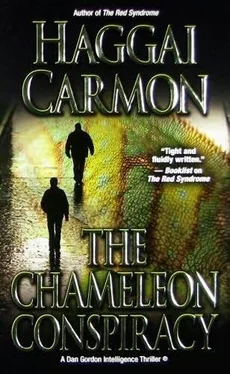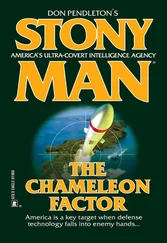Haggai Harmon - The Chameleon Conspiracy
Здесь есть возможность читать онлайн «Haggai Harmon - The Chameleon Conspiracy» весь текст электронной книги совершенно бесплатно (целиком полную версию без сокращений). В некоторых случаях можно слушать аудио, скачать через торрент в формате fb2 и присутствует краткое содержание. Жанр: Триллер, на английском языке. Описание произведения, (предисловие) а так же отзывы посетителей доступны на портале библиотеки ЛибКат.
- Название:The Chameleon Conspiracy
- Автор:
- Жанр:
- Год:неизвестен
- ISBN:нет данных
- Рейтинг книги:5 / 5. Голосов: 1
-
Избранное:Добавить в избранное
- Отзывы:
-
Ваша оценка:
- 100
- 1
- 2
- 3
- 4
- 5
The Chameleon Conspiracy: краткое содержание, описание и аннотация
Предлагаем к чтению аннотацию, описание, краткое содержание или предисловие (зависит от того, что написал сам автор книги «The Chameleon Conspiracy»). Если вы не нашли необходимую информацию о книге — напишите в комментариях, мы постараемся отыскать её.
The Chameleon Conspiracy — читать онлайн бесплатно полную книгу (весь текст) целиком
Ниже представлен текст книги, разбитый по страницам. Система сохранения места последней прочитанной страницы, позволяет с удобством читать онлайн бесплатно книгу «The Chameleon Conspiracy», без необходимости каждый раз заново искать на чём Вы остановились. Поставьте закладку, и сможете в любой момент перейти на страницу, на которой закончили чтение.
Интервал:
Закладка:
Erikka was standing near the reception desk in the lobby. “Good timing,” she said. “I’m expecting a classmate. Want to join us?”
As a well-dressed man walked into the lobby, Erikka whispered, “Here he is. Farshad Shahab!” she exclaimed and ran toward him with her arms stretched to embrace him.
Visibly uncomfortable, the man stepped back. “Sorry,” he said quickly. “It’s not allowed in public.”
“I’m sorry,” said Erikka. “It’s just that I’m so glad to see you.” I was uneasy. How could she be so heedless?
“Same here,” he said. “But things have changed.”
“Farshad,” said Erikka. “I want you to meet Ian Pour Laval. Ian is an author who is currently writing a novel on a romance between an Iranian Muslim man and an Austrian Catholic woman. I’m helping him with his cultural research.” We sat in the lobby and ordered cherry juice. Erikka excused herself and went to the ladies’ room.
“Difficult subject,” said Farshad, looking at me with interest. “Why?” I asked.
“Because of the cultural gap and the religious clash. Where does the romance take place?” he asked.
“In Tehran,” I answered.
“That makes it particularly complex,” he said. “The love must be very strong and the couple very per sis tent for the relationship to survive.”
“The Iranian society, as a whole, will not accept a European woman marrying an Iranian man?”
“Many will accept, to an extent,” he said. “But the price for the woman will be high. She’ll have to convert and adopt all tenets of our religion and culture. That means she’ll have to give up her past and become a Muslim woman, not only by adopting our traditions and religion, but also in the way she conducts herself and raises her children. She’ll have to forego many of her values, her culture, and-most of all-her beliefs on women’s place in the society.”
“Will there ever be a change?” I asked. “I mean, will Iranian women ever be treated as we treat women in Canada…equally?”
He shook his head. “The Muslim Revolution gave us pride, but it also took us back in time, as far as human rights and women’s rights are concerned. Religions don’t change.”
That was a bold statement, I thought. The little devil in me took notice. “Back in time?”
“Yes. I’m not criticizing it, of course. The so-called ‘modernity’ that the Shah and his corrupt followers brought exposed the Iranian society to Western-style ‘values,’ but the Iranian people much prefer the old style.” He uttered the word values with visible disgust. I sensed it was an overkill gesture, as if he knew somebody was watching.
Erikka returned, and she and Farshad commenced with their conversation reminiscing about old times. I didn’t want to interrupt. I excused myself and returned to my room.
An hour later I went back to the lobby. Farshad and Erikka were still chatting.
“Ian,” said Erikka. “Farshad just started telling me about what it was like to be here during the Islamic Revolution. Why don’t you come listen? Could be interesting background for your book.”
With a serious face Farshad said, “Please don’t mention you’ve met me, and don’t use my name in your book.”
The request was odd, given that they had been chatting publicly in a hotel lobby for more than an hour. I was sure the Iranian security services already knew about his contact with foreigners.
“Of course, you have my word,” I said. “I just need background information to understand the political and social atmosphere at the time. My novel starts about a year after the revolution.”
Farshad relented. “It was exciting and frightening at the same time,” he said. “As a young Iranian I was proud that there was a popular uprising hoping to topple the crooked regime of the Shah, but as a moderate Muslim I was concerned at hatred I saw in the extremists. Instead of promoting a political change, which most Iranians supported, the mullahs took over, and instituted a theocracy intolerant of any other opinion.”
I registered surprise, in my suspicious mind, to hear that. “Where were you when the unrest began?” asked Erikka. “That whole period is so blurred in my memory, but I remember well the beginning. It was on ‘Black Friday,’ September 8, 1978. I was a senior at our high school and had plans to go to the U.S. for college.”
“Yes, I think you told me about that plan at the time,” said Erikka.
“I was in my room at home and heard noises-gunfire and shouting. My parents didn’t allow me to leave the house; I was under a family-imposed curfew. So I climbed to our rooftop and saw flames. Parts of southern Tehran were on fire. The student-led revolution against the Shah had begun, but I didn’t know it then. The Shah had declared martial law, and a citywide curfew was enforced by armed soldiers. Just to make sure he’d maintain control, the Shah also turned off the power every evening to the entire city of Tehran. That made the nights very quiet, except for bursts of gunfire.”
“I remember that,” said Erikka. “I was so frightened.”
“The uprising was spreading,” continued Farshad. “Other citizens joined the students. Most people were staying home and obeying the curfew. But many others climbed on their rooftops chanting and praying. Angry soldiers loyal to the Shah interpreted that as defiance and were shooting anyone seen on the roofs. I heard people chanting ‘Allaahu Akbar’ -‘God is Great.’ Those incidents spread from southern Tehran, which is heavily populated by poor people, to the northern parts, where the rich and powerful live. My father was an ethnic Iranian, but he was fearful for our safety, because my mother is Italian. So two weeks later he sent me with my mother to Rome to stay with my maternal grandparents.”
“That means you weren’t here when the revolution toppled the Shah?” I asked.
“I returned to Tehran six months later when his regime was already doomed.”
“From what I know, the hatred was directed against the U.S.” I said.
Farshad nodded. “But those who captured the U.S. Embassy weren’t the real fanatics.”
You can say that again, I thought. Even he doesn’t believe it. I saw their hatred on TV. If that mob wasn’t fanatic, then I’d like to see who are fanatics, in his opinion.
“They were protesting against the U.S. for agreeing to let the Shah undergo cancer treatment in the U.S.”
“What happened to your plans to go to college in the U.S.? Did they ever materialize?”
“Yes, I was lucky. I went to the University of Nebraska in Lincoln.”
I smiled. “Not too many people like to leave that beautiful state, unless they have to. But you returned to Iran.”
I regretted that statement immediately. It was too sarcastic. But he didn’t seem to mind.
“I agree,” he said. “It was difficult, but my family needed me here, so after spending just two more years in Nebraska after my graduation, I returned home.”
“Was it hard? I mean shifting from the Western-style society in Nebraska to a different culture in Iran?” I chose my words carefully to make them as benign as possible.
“Only for a short period. After all, I’m Iranian, and I was returning home.”
“Farshad is a mechanical engineer and works for an oil company,” said Erikka, looking at me. Turning her head toward him, she added, “You’ll prepare the list for me, won’t you?”
“Sure,” he said. “But I know only a handful of graduates who are in Iran. Many who were brought up in a school such as ours couldn’t cope with the changing atmosphere in Iran and left.”
“Where to?” I was really curious.
“Some went to the Gulf States, some to India and Pakistan, and some went to the U.S.” A boxing-ring bell rang in my head. However, I decided not to press the issue at this time. In that kind of subtle questioning, less is more. I hoped that Erikka wouldn’t pose the follow-up question, Who went to the U.S.?
Читать дальшеИнтервал:
Закладка:
Похожие книги на «The Chameleon Conspiracy»
Представляем Вашему вниманию похожие книги на «The Chameleon Conspiracy» списком для выбора. Мы отобрали схожую по названию и смыслу литературу в надежде предоставить читателям больше вариантов отыскать новые, интересные, ещё непрочитанные произведения.
Обсуждение, отзывы о книге «The Chameleon Conspiracy» и просто собственные мнения читателей. Оставьте ваши комментарии, напишите, что Вы думаете о произведении, его смысле или главных героях. Укажите что конкретно понравилось, а что нет, и почему Вы так считаете.












